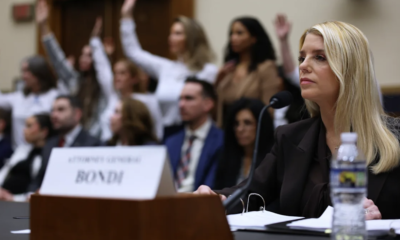US Elections
Kamala Harris’ $1 Billion Campaign Spending Shocker: Lavish Parties, Private Jets, and Celebrity Endorsements Spark Outrage
Vice President Kamala Harris’ presidential campaign for the 2024 U.S. election is under the spotlight after Federal Election Commission (FEC) filings revealed an expenditure of over $1 billion in just three months and over $1.8 Billion in 15 weeks. The campaign’s financial decisions, which included payments to celebrity influencers, controversial activist groups, and extensive use of private jets, have sparked intense criticism and debate about political spending practices.
Lavish Celebrity Endorsements and Promotions
A significant portion of the campaign’s spending went toward enlisting high-profile celebrity endorsements. The Federal Election Commission records show two $500,000 payments to Oprah Winfrey’s Harpo Productions, coinciding with Oprah Winfrey’s appearances alongside Harris at campaign events, including a town hall and a Philadelphia rally. The move led to widespread allegations of Harris “buying” endorsements.
While Oprah Winfrey denied receiving personal fees, claiming the payments were for production costs, critics like GOP Rep. Greg Murphy lambasted the expenditure as “unconscionable.” Similarly, former stockbroker Jordan Belfort likened the payments to “money laundering.”
The campaign reportedly paid nearly $4 million to Village Marketing Agency, which connects brands with social media influencers. Celebrities such as Beyoncé, Bon Jovi, Ricky Martin, and Jennifer Lopez participated in campaign events, underscoring Harris’ emphasis on star power to energize voters.
Event and Media Production Costs
FEC filings show over $15 million was allocated for event production, which included lavish rallies and concerts featuring celebrity performers. The campaign also spent six figures creating a set for Kamala Harris’ interview on the popular Call Her Daddy podcast. Additionally, $12 million was directed to digital media consultants to bolster online outreach.
While these expenditures aimed to engage younger and diverse voter demographics, they drew criticism for prioritizing spectacle over substance, especially given the campaign’s eventual failure.
Controversial Donations to Activist Groups
The Harris campaign also allocated funds to left-leaning organizations that advocate for progressive causes. Among these were $150,000 contributions each to the Black Voters Matter Fund and the Black Church PAC, groups associated with calls to defund the police and push for reparations.
This financial support provoked a backlash from conservative commentators, who accused Harris of aligning with “radical” activist agendas. Despite these criticisms, Harris’ supporters argue that the contributions reflect her commitment to addressing systemic inequalities.
Environmental Hypocrisy Claims
Despite advocating for aggressive action against climate change, Kamala Harris’ campaign faced accusations of hypocrisy for spending over $4 million on private jet travel. Critics highlighted the discrepancy between her rhetoric on environmental sustainability and her campaign’s carbon footprint.
Mounting Debt and Fallout
Despite raising over $1 billion, the campaign ended in financial turmoil, carrying a $20 million debt by Election Day. Reports indicate $56 million was spent on payroll and payroll taxes, while over $100 million went to consulting and marketing firms such as Gambit Strategies LLC and Bully Pulpit Interactive LLC.
The campaign’s financial woes drew mockery from President-elect Donald Trump, who sarcastically offered to “help” the Democrats manage their debt, emphasizing his campaign’s reliance on low-cost “earned media.”
Lessons from a “$1 Billion Disaster”
Some commentators have characterized Harris’ campaign spending as an “epic disaster.” While her strategy aimed to merge celebrity influence, digital outreach, and progressive policy advocacy, it failed to resonate with voters. Critics argue that excessive spending highlights a disconnect between campaign priorities and voter concerns, particularly on economic and social issues.
As Kamala Harris conceded defeat at Howard University on November 6, she thanked her supporters but left unanswered questions about the effectiveness and ethics of modern political campaign spending.
The fallout from Harris’ campaign spending raises broader questions about the role of money in politics. With political campaigns becoming increasingly reliant on celebrity endorsements and costly productions, future candidates may face pressure to balance financial extravagance with grassroots outreach.
Ultimately, Harris’ campaign is a cautionary tale about the challenges of navigating modern electoral politics in the age of celebrity culture and digital media.








































